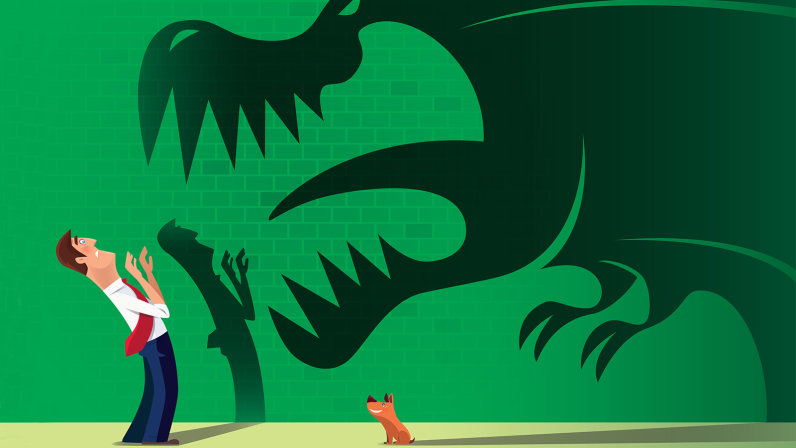This month I would like to address something that has been on my mind a lot lately: fear. All of us have dealt with a wide variety of fears and levels of fear throughout our lifetime.
One of the earliest, most powerful memories I have dealing with fear is from when I was a youngster of around ten or eleven. There was a big, rather mean boy named Clyde in our small town. He called me “Four Eyes” because I wore glasses and he dubbed one of my best friends “Sissy.” He would demand parts of our lunches, spit on our sneakers, tease us, and generally do whatever he could to make us miserable.
One day when we were playing Topies with our baseball cards he stepped in and took all of our cards. When I challenged him he punched me in the stomach. That was the first time he actually punched me.
Later, when I told my dad, he said, “He’s a chip off the old block!” Apparently, Clyde’s dad was the same way. “I expect he never picks on anyone his own size, right? He’s afraid and he’s trying to make you afraid. That’s why he only picks on smaller kids. Someone in your group will need to stand up to him and talking probably won’t do it. You will need to punch him in the face, as hard as you can, when he least expects it and then don’t let up!”

My first thought was, “You must be nuts!” Clyde was older and half again as big as any of the rest of us, myself included. There was no way I could beat him! But I couldn’t say that to my father, who had never backed away from a fight in his life.
After much internal struggle, I decided I could ignore Clyde‘s name calling but if he tried to steal something from me, I would follow through with my father’s suggestion.
I can remember the day it all came to a head like it was yesterday. My grandmother had given me a dime from her change jar to get her some black licorice. As my friend, Richard, and I left the store with the candy, I saw Clyde standing at the bottom of the steps.
“Hey Four Eyes, what kind of candy did you get for me today?”
I started to say it was for my grandmother, but before I could get the words out of my mouth, he grabbed the bag from my hand. “Thank you, you know licorice is my favorite!” He pulled out a piece and begin eating it.
When he looked down to get another piece, I did exactly what I had been repeating in my head over and over. I reached back, made a fist, and swung as hard as I could. I aimed right for the middle of his big round face. His nose shot blood like a fountain!
Clyde didn’t fall down like they did in the cowboy movies. He just stood there holding his nose covered in blood. But my father had said, don’t let up! So I just continued to punch him as fast and as hard as I could. The other kids were cheering me on.
Clyde started screaming and crying, trying to cover his face. Fearful of what might happen if I stopped, I kept punching, unable to quit. Clyde finally tried to run but fell. By that time, the store owner had come out and shouted for us to stop.
After that, Clyde never bothered me again and I was almost a minor celebrity among the other kids. But being a “hero” didn’t feel as good as I would have imagined it would. I didn’t feel proud of myself. Although no one else might have realized it, I knew I had been driven by fear and anger, and it didn’t feel good.
That was my first encounter with a bully, but not my last. Unfortunately bullies aren’t confined to the schoolyard. Fear is being used daily, to varying degrees, all around us to manipulate and control us in a wide variety of ways.

Photo by Tuva Mathilde Loland on Unsplash.com
As a counselor working with individuals and families for over 40 years, I’ve seen the damage bullies can wreak in families far too many times to count. One case that stands out is a woman I’ll call Danielle. Danielle had been attempting to survive in a very abusive relationship for almost 20 years. She remained in the same house with her common-law husband, tolerating all forms of abuse, because she was fearful he might kill her. “If you ever think about leaving me you will end up in the hospital if you’re lucky and in the morgue if you’re not,” he had told her. This is an extreme example of bullying in the family, but less severe forms are sadly not uncommon.
Bullies also show up in the workplace.
As a consultant to both for-profit and not-for profit companies and institutions I have seen leadership in varying positions of power use fear, both subtle and blatant, to control and manipulate employees. My contract as a consultant has been canceled more than once from confronting owners, administrators, or supervisors with this reality.
Even the church is not immune.
As an intercessor to congregations in conflict, I have witnessed clergy and church leaders also use fear to control and manipulate. While abusive spouses use threats of physical violence and employers hold the fear of unemployment over their employees’ heads, the weapon the church often wields over their parishioners is the anger and judgment of God. In many traditions, those in leadership, through guilt and fear, have and still are projecting a controlling and punishing God for various self-serving reasons.
Over the years, I’ve come to understand a few things about bullies. They are usually extremely weak and insecure at the core of their being. They attempt to control as much as they can—especially other people—to compensate for their extreme internal insecurity. They seldom, if ever, are able to admit or take responsibility or ownership for any mistake or wrongdoing. They have a strong pattern of blaming and attacking others. When cornered they will shift the blame or distract in any way to avoid ownership. They also tend to surround themselves with folks they see as weaker. Bullies reject anyone who challenges them and seldom seek advice or direction from others.
So how should we deal with bullies?
This is a question I have wrestled with as far back as I can remember—at least as far back as my experience with Clyde. Even now, I have an uneasy feeling in my stomach when I think of how I treated him. It doesn’t fit with my faith and how I want to treat other children of God.
I believe bullies need consequences and ignoring or justifying their behavior only empowers them, but I don’t think my father’s advice to “fight fire with fire” is correct either.[perfectpullquote align=”full” bordertop=”false” cite=”” link=”” color=”” class=”” size=””]Allowing myself to become infected with fear and anger, and resorting to violence only perpetuates the cycle when I want to end it.[/perfectpullquote]
It is clear to me now that Clyde was only doing what he had learned from his father. I’m sure his self-esteem was low. He didn’t have friends in school, was overweight and uncoordinated, and didn’t play sports or have anything he excelled at. It’s a long shot, but might trying to befriend Clyde have worked?
Another, less idealistic, option I might have tried is talking to the other boys. We had the power of numbers on our side. We were all harassed by Clyde, but we never confronted him as a group. One of the prime tactics of a bully is to isolate their victim from other people. What if we had all come together to take a stand?
I’ve seen this work in companies and congregations, where we have often been able to successfully contain a bully’s behavior when an overwhelming number of coworkers and employees or congregants join together to hold the bully to account. Occasionally, it even leads to soul searching and true change.
Social support is what eventually saved Danielle. Her brother is the one who brought her into counseling, and with his help, the support of therapy, the backing of her children, and the encouragement of other friends and family, Danielle was finally—when she had sufficiently worked up her self-esteem and developed a safety plan—able to leave her abuser and throw off the shackles of fear he had chained her with.
We will never overcome fear, anger, and violence with more of the same. We will never defeat bullies with their own tools. But if we come together, we may be able to find a different way.
QUESTIONS FOR DEEPENING THE JOURNEY
- What experiences in your personal life, school, workplace, church, or elsewhere have you had with bullying or people using fear to control and manipulate you?
- What is typically your response to such attempts? Do you ignore, appease, internalize, fight back, use humor to deflect, or something else? How do you feel about your response?
- Have you ever witnessed bullying? Did you get involved? Why or why not? Do you think people coming together can help end bullying?
- Have you ever used your position, superior power, or threats of retaliation to get your way? When? How did it make you feel? Did you think of this as bullying?
- Besides seeking support from others, what other responses do you think might work when dealing with a bully? If you can’t escape the bully, how can you minimize or eliminate the fear and anger they trigger inside you?
- Have you ever engaged in or seen a successful response to bullying? What can you take away from it?
- Have you ever felt bullied or controlled by someone else’s notion of God? What did they tell you God expected from you? Did their conception of God somehow serve their own interests?


Excellent article! Some day, if it will ever be possible, I would like to discuss it with you.
As a middle school counselor for 20 years, bullying was an issue that I had to deal with frequently. One of the first things I did was train 40 students, some who were marginalized, to work with each entering sixth grade class in once a month large group sessions in our gym to help foster a sense of community, purpose, and respect. It was often helpful to meet one on one with students who were accused of bullying, to try to understand where their anger was coming from and why they felt a need to control others. People need to… Read more »
Although I have not been subject to much bullying in my life, I like your approach to understanding what drives individuals to act in this way. Where or why did the disrespect develop? How can we get the conversation to open an avenue for reconciliation. These are tough questions.
Good post, Terry – thank you.
Darkness cannot drive out darkness; only light can do that. Hate cannot drive out hate; only love can do that.
MLK Jr.
Something worth remembering from now until November 3rd . . .
So true! Encourage everyone we know to vote!!
Food for thought, Terry. As a high school counselor, I ran a peer mediation project, helping students learn to intervene in conflicts. It was the most gratifying experience, helping to break the cycle of bullying and intimidation in our school, keeping us all safe during those dreadful “Columbine” years. Sadly,, we are witnessing the effects of fear tactics all around us now, and coming together to vote in November is the strongest response we can make. Thanks for the encouragement!
Terry, as always, your blogs are so insightful, thought-provoking and enlightening. Reading your message caused me to think back to bullies I’ve experienced, and my response. Tragically, we have a bully occupying the White House and getting away with it. Ironically in this case, the term “the bully pulpit” is all too apt. Hopefully, enough citizens will stand up to his behavior in November and show him that “we’re not going to take it anymore.” It’s that old, adage “Evil wins when good people do nothing.”
Bill Tremitiere